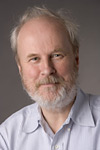| Tuesday, October 14, 2008 |
| Subscribe | Contact Fermilab Today | Archive | Classifieds |
APS honors Fermilab's Ellis for work on the strong forceFor more than 30 years, Fermilab’s Keith Ellis has provided experimenters with crucial calculations that help them analyze their data and make discoveries. This year, the American Physical Society recognized his work with the J.J. Sakurai Prize for Theoretical Particle Physics. He shares the prize with Davison Soper, University of Oregon, and John Collins, Penn State University. All three received the award for their work “ in perturbative quantum chromodynamics, including applications to problems pivotal to the interpretation of high energy particle collisions,” according to the APS citation. Quantum chromodynamics is the theory that describes the interactions of the strong force, which binds quarks together. An exact solution of QCD equations is so far elusive. Instead, physicists rely on approximations such as perturbative methods or computer-based lattice calculations to determine subatomic QCD effects. During the last 30 years, these approximations have become increasingly precise. In addition to providing a better understanding of QCD, the calculations allow experimenters to separate QCD effects from other subatomic phenomena, providing a clearer picture of, for example, the weak force. For many subatomic processes observed at particle colliders, it still remains a challenge to determine QCD contributions with 10 percent uncertainty or less. Ellis remembers sitting as a postdoc in an office at the Massachusetts Institute of Technology in 1977 and carrying out a perturbative QCD calculation for one of his first scientific articles on the topic. “Now those early calculations are given as exercises to advanced graduate students,” he said. Today’s state-of-the-art perturbative calculations are far more complex, and theorists rely on computer-algebra programs to manage the components that make up the final result. “Without computer algebra, today’s calculations would not be possible,” said Ellis, who pointed out that the calculations are carried out by a small group of people worldwide. Ellis joined Fermilab in 1984 and served as head of the Theoretical Physics Department from 1992 to 2004. During this time, he taught the tricks of the trade to numerous postdocs who went on and became university professors, and he helped build a strong group of perturbative QCD experts at Fermilab. “Keith is a founding father of the group,” said Chris Hill, head of the Fermilab Theoretical Physics Department. "The Fermilab Theory Group is a leading center in the world for this kind of physics." The calculations are essential for collider experiments at the Tevatron and the LHC as well as proposed future colliders such as the International Linear Collider and a muon collider. “When you want to make precise determinations of the fundamental parameters of nature, then you need to understand the QCD contributions with equally high precision ,” Hill said. Ellis maintains a repository for some of the tools used in carrying out QCD calculations at this Web site: http://qcdloop.fnal.gov/ -- Kurt Riesselmann |
